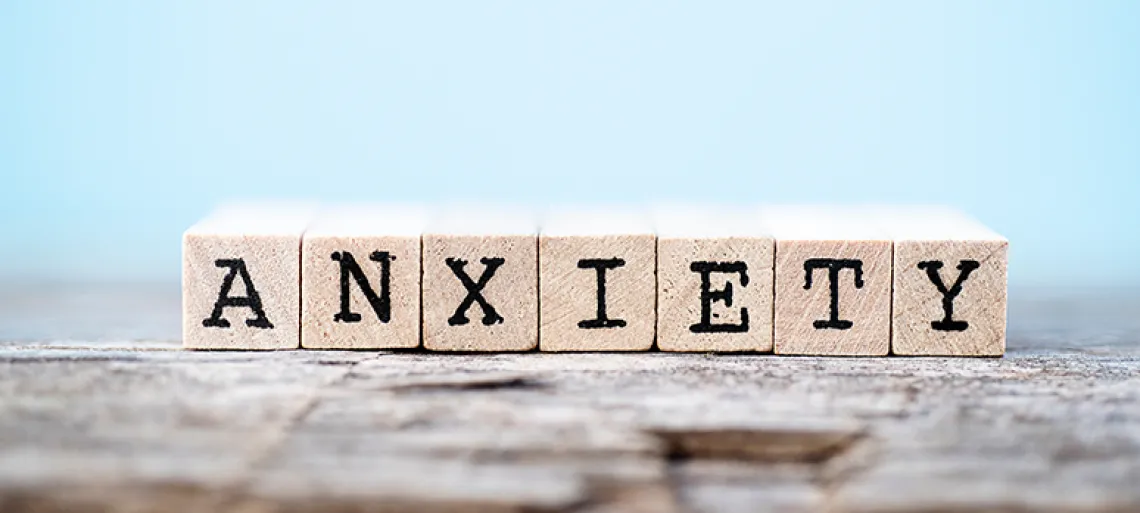When Anxiety Becomes a Problem

Everyone experiences stress and anxiety to some degree. If you find yourself in a constant state of worry and continually unable to relax, you may be experiencing generalized anxiety disorder. Thankfully, there are several treatment options to help you keep your anxiety from interfering with your enjoyment of life. If you suspect that you have an anxiety disorder, seek professional help, and educate yourself on the condition.
Understanding Generalized Anxiety Disorder
Each of us has normal, everyday fears and concerns that we can usually manage or resolve. Generalized anxiety disorder (GAD), however, is manifested by chronic, exaggerated worries that usually are provoked by no apparent cause or other illness. Though these persistent fears are typically irrational, the individual often expects the worst to happen, such as a deadly crash, a family disaster, sudden sickness or financial ruin.
Unlike many people with other anxiety disorders, like phobias, people with GAD usually do not avoid frightening objects or situations. They are able to function and maintain relationships. Yet the constant worries and sense of dread they experience often limit their ability to experience life to the fullest. The unresolved anxiety also can trigger a variety of health problems and symptoms, including:
- Nervousness
- Trembling
- Twitching
- Sweating
- Irritability
- Difficulty concentrating
- Shortness of breath
- Muscle tension
- Lightheadedness
- Indigestion and abdominal pain
- Difficulty falling or remaining asleep
Though researchers do not know exactly what triggers GAD, they believe it probably is caused by a combination of stressful life events and biological factors. Other disorders may be present in addition to GAD, such as panic disorder or depression. In general, the onset of GAD is gradual and often begins in childhood. Symptoms have a tendency to decrease with age.
If you have worried excessively about a variety of problems over six months or longer, you may have GAD. Do not be afraid to seek help. A therapist can talk to you about what you are experiencing and put you in touch with support resources and a specialist who can help treat the disorder.
Treatment
There are several treatment options that your physician and therapist can coordinate. Your involvement in treatment will require patience and diligence. Anxieties take time to resolve. The more you learn about the condition and recognize your patterns of thought, the better chance you have of effectively managing GAD.
Treatment includes:
- Cognitive-behavioral therapy. This therapy works with a combination of behavioral techniques like breathing and relaxation exercises that help you change the way you think about your anxiety.
- Habituation exercises. This approach can help individuals confront their fears and learn to diminish anxiety.
- Systematic desensitization (also called exposure and response prevention). These exercises help individuals overcome their GAD behaviors by exposing them to frightening thoughts or situations.
- Deep-breathing exercises and relaxation techniques. These techniques, such as progressive muscle relaxation exercises that teach you to tense, hold, focus on and slowly release different muscle groups, help reduce the symptoms of anxiety.
- Medication. Your doctor or a psychiatrist can talk with you about medications that are used to control anxiety successfully.
Another widely used treatment method is traditional talk therapy: working with a therapist to resolve your fears and problems. A therapist may help you uncover the causes of your anxieties and suggest coping techniques. In talk therapy, you learn to recognize how certain thoughts can provoke anxiety symptoms and how to change those thought patterns to decrease future anxiety episodes. Your therapist also may prescribe medication in combination with talk or behavioral therapy.
Your doctor also may suggest eliminating caffeine and alcohol from your diet. These drugs have been known to cause or increase anxiety.
Anxiety Disorder Self-test
Take this self-test, and talk to your doctor about the results. Answer yes or no to each question. Are you troubled by:
- Repeated, unexpected panic attacks during which you suddenly are overcome by intense fear or discomfort for no apparent reason?
- Persistent, intrusive thoughts, impulses or images that you cannot get out of your mind (such as a preoccupation with getting dirty, worry about the order of things or aggressive or sexual impulses)? A powerful and ongoing fear of social situations involving unfamiliar people?
- Excessive worrying, for six months or more, about a number of events or activities?
- Fear of places or situations where getting help or escaping might be difficult, such as in a crowd or on a bridge?
- Shortness of breath or a racing heart for no apparent reason?
- A persistent and unreasonable fear of an object or situation, such as flying, heights, animals, blood, etc.?
- Being unable to travel alone?
- Spending too much time each day doing things over and over again (e.g., handwashing or counting)? Having tense muscles or problems sleeping more often than not?
- Experiencing or witnessing a traumatic event that involved actual or threatened death or serious injury to yourself or a loved one (e.g., military combat, a serious car accident)?
- Your anxiety interfering with your daily life?
Do not let anxiety control you; learn to control it by seeking help and educating yourself on the topic. Get involved in an anxiety support group, and ask friends and family to help you identify any recurrence of irrational behaviors. When you feel anxiety coming on, attempt to rationalize your fears and relax. Try deep-breathing exercises, imagery techniques and meditation to calm down and get through the situation.
Resources
Anxiety Disorders Association of America (ADAA)
American Psychiatric Association
Freedom From Fear (FFF)
©2023 ComPsych ® Corporation. All rights reserved. This information is for educational purposes only. It is always important to consult with the appropriate professional on financial, medical, legal, behavioral or other issues. As you read this information, it is your responsibility to make sure that the facts and ideas apply to your situation.

